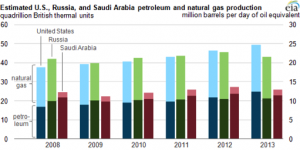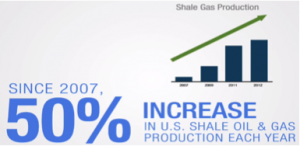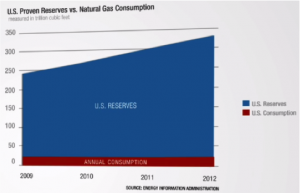Today, ACCF is releasing a new video – narrated by the Honorable Harold Ford, Jr. (D-TN) – telling the story of the Main Street benefits available to the United States through the export of liquefied natural gas.
The U.S. energy reality has changed drastically of late, driven by game-changing advances in the production of natural gas from shale. Annual production ofnatural gas and oil from shale has grown by more than 50 percent since 2007, helping the United States to assert itself as a global energy superpower. The U.S. is now the world’s leading producer of natural gas, and the domestic and geopolitical implications of this feat are tremendous.
 The U.S. is now producing more natural gas than any other nation – recently overtaking the former global leader, Russia. And global production dynamics demonstrate that this is not an isolated or temporary condition. In 2014, conservative estimates from the Energy Information Administration (EIA) project that the U.S. will produce approximately 24 trillion cubic feet of natural gas and that Russia is on a downward slope at closer to 21 trillion cubic feet of natural gas.
The U.S. is now producing more natural gas than any other nation – recently overtaking the former global leader, Russia. And global production dynamics demonstrate that this is not an isolated or temporary condition. In 2014, conservative estimates from the Energy Information Administration (EIA) project that the U.S. will produce approximately 24 trillion cubic feet of natural gas and that Russia is on a downward slope at closer to 21 trillion cubic feet of natural gas.
The United States has the capability and ingenuity to produce at even greater levels and to reap even greater economic benefit. But until energy and trade policies in Washington are revised to reflect the new energy reality and our new role as a global leader, we risk leaving much on the table.
Legislation supported by both Republicans and Democrats – H.R.6 and S.2083 – would increase the benefits Americans receive from our vast resources, encouraging greater production at home and better enabling us to capitalize on the geopolitical power of our ample domestic energy. Given extensive debate and a clear and growing body of favorable research on the topic of LNG exports, both of these bills deserve urgent, strong, and bipartisan support.
 Reserves: According to the EIA, in 2012 the U.S. consumed approximately 25 trillion cubic feet of natural gas while our proven reserves are estimated at at 334 trillion cubic feet.
Reserves: According to the EIA, in 2012 the U.S. consumed approximately 25 trillion cubic feet of natural gas while our proven reserves are estimated at at 334 trillion cubic feet.
We have sufficient capacity to export LNG while satisfying our domestic needs – and the more our businesses invest in this burgeoning sector, the more reserves are uncovered and greater production is achieved. What’s more, exporting our excess supply of natural gas would enable us to bolster our international allies by delivering needed energy and diversifying their sources – yielding direct benefits to American national security.
The 50% annual increase in U.S. shale oil and gas production noted by McKinsey Global Institute’s report, “Game Changers,” is evidence of what is possible in a new American energy reality. And the economic benefits of this boom are unmistakable.
 Economic Development: This shale gas revolution is revitalizing the heart of small town America, already supporting 1.7 million jobs, according to a study by IHS Global Insight. Those numbers grow to 3.5 million in the next twenty years.
Economic Development: This shale gas revolution is revitalizing the heart of small town America, already supporting 1.7 million jobs, according to a study by IHS Global Insight. Those numbers grow to 3.5 million in the next twenty years.
These jobs reach far beyond traditional “oil states,” and far beyond the wellhead. A recent McClatchy piece titled “Energy boom feeds other business, too,” published in the Kansas City Star, examines the way that the boom has energized Main Street. The piece notes: “A rust-bucket town near Buffalo is a perfect example of the transformation that fracking has brought to American business, where new life has been breathed into manufacturing and the nation’s railroads, even as much the economy bumps along at a subpar pace.” The article goes on to note how Kansas businesses are finding economic benefits from natural gas production in other states. States like Ohio, Arkansas, Pennsylvania, and countless others are at the heart of the boom.
Economic Benefits: According to study commissioned by the Department of Energy and conducted by NERA Consulting, the U.S. would experience net economic benefits from increased LNG exports. In fact, the report notes, “for every one of the market scenarios examined, net economic benefits increased as the level of LNG exports increased.” The academic and economic case for exports is abundantly clear.
Organizations like the National Association of Waterfront Employers and Associated General Contractors of America are coming out in favor of H.R.6 and S.2083 because the thousands of members they represent throughout the United States benefit from increased energy production here at home.
Conclusion: The U.S. economic recovery – built on a rebirth of industries, job creation, leveling the trade balance, and regaining our global standing – is at our fingertips. As former Representative Harold Ford Jr. says in our newly released video: “Shale oil and gas development is a game changer. The U.S. is an energy power player, and we have to work hard to make sure it stays that way, because there is a lot at stake.”
If we are unable to move beyond the current status quo characterized by years-long delay and failure to act, the progress and benefits available through our vast energy resources will be stifled. It is important that our energy infrastructure is improved now in order to continue development and keep global prices competitive.
U.S. ingenuity is flourishing and unlocking new economic realities; we need bipartisan policy decisions to allow us to work hard to keep it that way. We need to Act on LNG.






